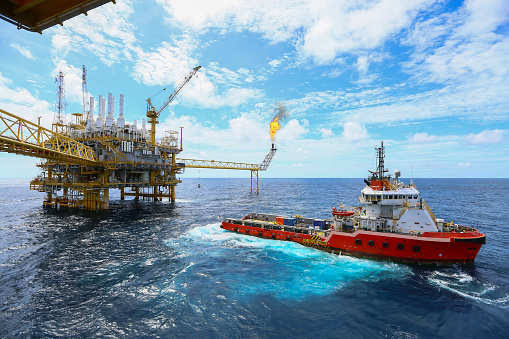Deepwater oil exploration is back in the spotlight as major energy companies gather for the annual showcase of offshore projects and equipment in Houston this week. Recent discoveries in Guyana, Namibia, and the U.S. Gulf Coast are fueling renewed interest in this sector.
Shifting Tides: From Shale Boom to Deepwater Revival
The shale oil boom of recent years, with its readily accessible reserves, led to a decline in deepwater exploration. However, rising oil prices and cost overruns associated with some past deepwater projects pushed these endeavors to the back burner.
The tide is now turning. New deepwater projects offer a combination of attractive features for oil and gas companies: longer production lifespans, lower breakeven costs, significant resource potential, and reduced carbon emissions compared to other sources. According to Pablo Medina, head of new ventures at energy consultancy Welligence, “Deepwater is back in vogue.”
Consultancy Rystad Energy predicts a significant rise in capital spending for entirely new deepwater drilling projects, reaching a 12-year high next year. Overall investment in both new and existing deepwater fields could reach $130.7 billion by 2027, reflecting a 30% increase over 2023 figures.
Namibia’s Discoveries Take Center Stage
Industry experts anticipate that the recent string of oil finds off the West African coast, particularly in Namibia, will be a major topic of discussion at the Offshore Technology Conference (OTC). James West, senior managing director at financial firm Evercore, highlights the significance of these discoveries, stating, “The return of offshore and deepwater operations is going to be a big topic at OTC, and Namibia is going to be talk of the show.”
With crude oil prices hovering above $70 per barrel, energy companies can expect a return on their deepwater investments within a relatively short timeframe of six years. This faster payback period is particularly attractive considering the extended lifespans of these wells compared to shale oil production. An additional benefit is the lower carbon footprint associated with deepwater resources. Studies by Rystad Energy indicate that deepwater oil production generates an average of 2 kilograms less carbon dioxide per barrel compared to shale oil.
Technological Advancements and Promising Discoveries
Renewed enthusiasm for deepwater exploration is fueled by exciting discoveries and technological breakthroughs. For instance, Namibia’s Mopane well is estimated to hold a staggering 10 billion barrels of oil, according to a recent announcement by Portuguese oil company Galp Energia.
Another significant development is the Anchor project in the Gulf of Mexico, a collaboration between Chevron and TotalEnergies. This project represents a breakthrough in ultra-high-pressure environments, operating at previously unimaginable pressures of 20,000 pounds per square inch. The Anchor platform is poised to begin production off the Louisiana coast, with an anticipated peak output of 75,000 barrels of crude oil per day and a projected operational lifespan of 30 years.
The Stabroek block off the coast of Guyana has emerged as another success story, demonstrating the potential for low-cost production that rivals the best deepwater fields globally. Rystad Energy estimates that over the next six years, more than half of the recoverable resources from the Stabroek block can be extracted at a breakeven price below $30 per barrel. This cost-effectiveness is comparable to approximately 80% of the recoverable deepwater resources off the coast of Norway.
Renewed Interest Boosts Offshore Services
The resurgent interest in deepwater exploration has resulted in increased demand for offshore drilling contractors. Daily rates for some drilling vessels have surpassed $500,000, and contract durations are lengthening due to a shrinking supply of available vessels. Leslie Cook, upstream supply chain analyst at Wood Mackenzie consultants, anticipates that the deepwater rig market will reach a peak within the next 18 months, followed by a period of stabilization.
Source: Reuters



